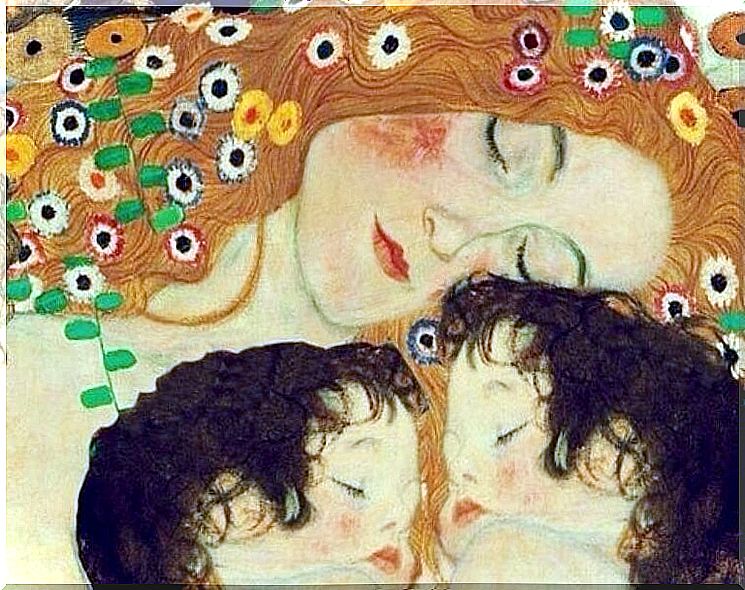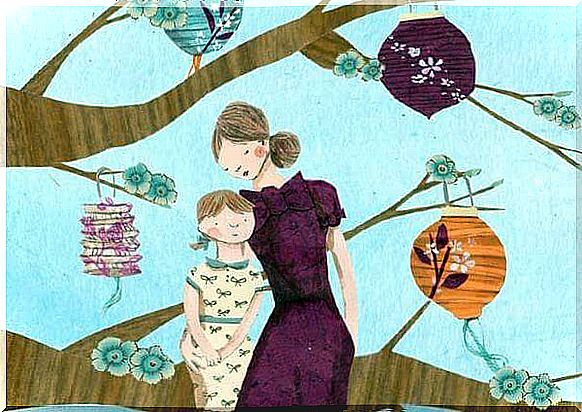Reconciling With A Difficult Mother

The mother is the first great love in the life of all human beings. A love that is born naturally and that we do not renounce, even if she is not there, or despite the fact that her presence is harmful, and even dangerous, for a child. There is always an invisible thread that in some way or another links us to it.
The psychoanalyst Judith Viorst narrates in one of her books an atrocious case. A three-year-old boy had been doused with alcohol and, something that seems unthinkable, his own mother set him on fire. In the intensive care room, the little boy only wanted one thing: for her to come and hug him. That’s how strong that primitive bond is. Either way, we love our mother. At the beginning of life we prefer any suffering, rather than suffering the pain of not having her by our side.
Love for the mother subsists in adult life, even if we go our own way, even if we achieve gigantic success, even if we have money, or are admired for our prowess. In the background there is always something of that child who does not want to live without his mother.
The difficult mother

As children, and despite any evidence to the contrary, we think that our mother is an absolutely perfect being. We only need her to be there, by our side. And if it’s not there, we think it might be our fault. But mothers are not those total and perfect beings that we idealize when we are little. We are not always completely welcome in your life.
Mothers also get depressed, they also have problems of their own. And although the desire of most of them is to give us their best, sometimes they cannot. Sometimes they give up on it, or have a not-so-healthy idea of what the welfare of a child is.
Many mothers are not there when their children need them. They must, or want, to work outside the home and may have little time to exercise mediocre motherhood. Other women have a rejection, conscious or unconscious, towards motherhood. They still take on the task of being mothers, but only half do it. Then your children become the target of your disagreement.
They are the mothers who fail to see anything good in their children. They are never obedient enough, nor capable enough to make her happy. Whether they are the best students, or the most outstanding athletes. It doesn’t matter, they never live up to your expectations.
Rejection by children sometimes also takes unexpected forms. This is the case of anxious mothers, who are always imagining that the child is going to fall, that the young man is going to become a drug addict, that the daughter is going to make an irreparable mistake. In those cases, rejection takes the form of extreme control. They think that educating their children is showing them that the world is a place full of dangers and that their task is to make them see the threatening side.
Early and late reconciliations

During childhood, we basically don’t have the emotional capacity to question our mother. She is at the base of everything, on the horizon of everything, and we may not like some of her behaviors, but we feel that it is not lawful to criticize her. Things change during adolescence. In general, this stage is much more conflictive for those who have had to deal with a difficult mother.
Adolescence is a transition in which the child we were and the adult we want to be are confronted. That is when it is essential to question what we have received at home, to forge our own identity. In adolescence is where the questions and questions about our parents begin. It is the moment of the big ruptures with the parents.
If before we did not allow ourselves to criticize our mother, now she becomes the object of much of our dissatisfaction. She wants us to remain the child they know, while we need to fly. But just as adolescence can be the beginning of great distances with those beloved figures, it is also a stage where it is possible to adjust many loose ends.
A mother who has become aware that her role has not been the best, can take advantage of the time of adolescence to repair many of her mistakes. Teenagers need parents deeply, much more than they are willing to admit. A loving, patient and intelligent accompaniment during this stage can repair many of the failures that occurred during child rearing.
Conflicts come out in a sometimes crude and harsh way. But it is precisely an opportunity to channel them and give them a solution. The young man is already able to understand that his mother is a person with limits and the mother can admit those limitations. Sometimes it is not possible to avoid building large barriers. It is when children only finish understanding their parents if they become parents.
There they discover the impossibility of being the perfect manual parents and understand that the error is at the base of many human realities. That a mother who makes mistakes is not a bad mother, but an imperfect person, as we all are.

Whatever the case, there is an indisputable truth: all the affective relationships of a person are marked by the bond he had with his mother, his first love.
The healthier that relationship, the healthier the others will be. And it is never too late to review that link. To forgive her and ask for forgiveness. To give free rein to that love that has always been there and, with it, clear the way to a more rewarding life.
Image courtesy of Emma Block, Claudia Tremblay, Gustav Klimt









